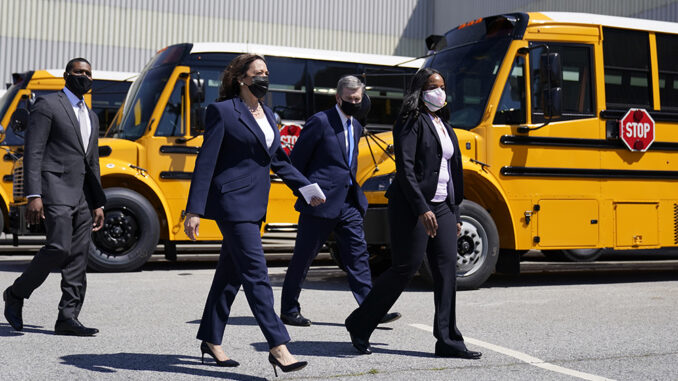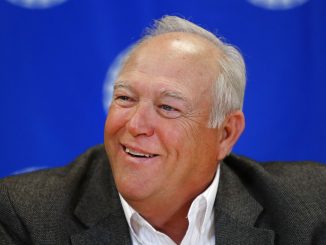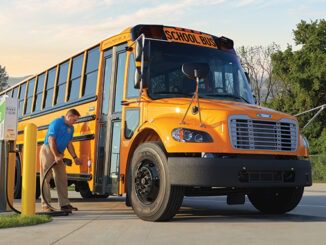
NEW YORK — The United Auto Workers union announced it reached a last-minute tentative agreement with truck and bus manufacturer Daimler Truck, averting a potential strike of more than 7,000 workers in North Carolina.
The union struck a four-year agreement with the German company on Friday evening just before the expiration of the previous contract, which was enacted six years ago. It covers workers at various plants in North Carolina — where Daimler makes Thomas Built Buses, Freightliner and Western Star trucks — as well as distribution centers in Atlanta and Memphis, Tennessee.
In an online speech, UAW President Shawn Fain said the new contract includes wage increases of more than 25% over the next four years, including a 10% raise after the deal is ratified. Fain said the deal also includes the end of wage tiers at the company as well as cost-of-living adjustments and “profit sharing for the first time in Daimler history.”
“When that deadline came closer, the company was suddenly ready to talk,” Fain said. “So tonight, we celebrate.”
Union members still need to approve the agreement.
“The UAW members at these locations will now be asked to vote on the new contracts, and we hope to finalize them soon, for the mutual benefit of all parties,” Daimler said in a statement. The heavy-duty manufacturer was once the same company as Mercedes-Benz before it split off in 2021.
The Daimler deal comes amid a broad campaign by the UAW to organize Southern auto assembly plants following lucrative new contracts in a confrontation with Detroit’s automakers.
A Volkswagen AG plant in Chattanooga, Tennessee, chose to join the UAW on April 19. It was the union’s first in a Southern assembly plant owned by a foreign automaker. A group of Southern governors lobbied workers to oppose the union effort in Tennessee. The governors, from Alabama, Georgia, Mississippi, South Carolina and Texas said in a statement last Tuesday that they have worked to bring good-paying jobs to their states.
“We are seeing in the fallout of the Detroit Three strike with those automakers rethinking investments and cutting jobs,” the statement said. “Putting businesses in our states in that position is the last thing we want to do.” The governors expressed concern that unionization could lead to jobs leaving their states. “We’ve seen it play out this way every single time a foreign automaker plant has been unionized; not one of those plants remains in operation,” said the governors in a joint statement.
Ford Motor Co. CEO Jim Farley said in February that his company will “think carefully” about where it will build new vehicles after the UAW’s strike last year. If the UAW organizes other automakers, it could raise their costs, leading them to build more vehicles outside the United States.
“I think it’s unwise to put your future in somebody else’s hands,” said Tennessee Gov. Bill Lee following the vote. “But those workers made that decision based on the individual circumstances of that plant. I think it was a mistake, but that’s their choice.”
Following the win in Tennessee, Fain indicated his group’s continued push for unionization in the South. “You guys are leading the way. We’re going to carry this fight on to Mercedes and everywhere else,” said Fain. Workers at Mercedes factories in Tuscaloosa, Alabama, will vote on UAW representation in May.
Southern states are responding to increased union activity by passing laws that could claw back economic incentive dollars if companies recognize unions without requiring a secret ballot election. Every major Southern auto plant has received state economic development assistance.
Georgia Gov. Brian Kemp signed such a law Monday, and Lee signed one in Tennessee last year. Alabama lawmakers are advancing such a measure.
Supporters believe unions can unfairly pressure workers into signing cards, while employers have a better chance of defeating unions in secret ballot elections. Federal law also allows employers to recognize unions if a majority of workers return signed cards authorizing unions to represent them, a process known as a card check. But those who support unions argue the laws violate the National Labor Relations Act, which allows voluntary recognition.
U.S. Labor Secretary Julie Su said she’s not sure if the Labor Department will seek to challenge the laws, noting the National Labor Relations Board, which oversees union affairs, has primary responsibility. But she said that “there are federal standards beneath which no worker should have to live and work.”
North State Journal staff contributed to this report.



